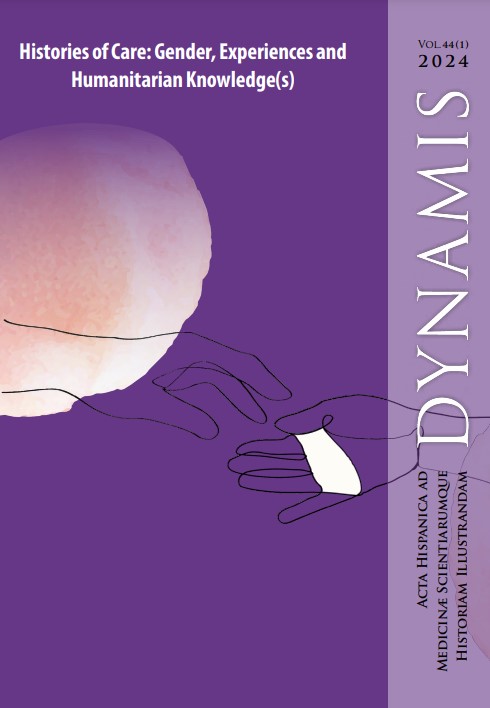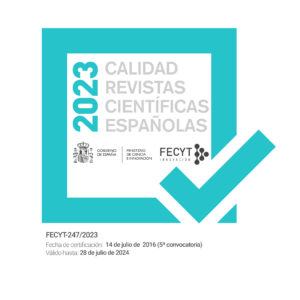What is the history of care the history of?
DOI:
https://doi.org/10.30827/dynamis.v44i1.30723Descargas
Citas
Bacopoulous-Viau, Alexandra and Fauvel, Aude. “The patient’s Turn Roy Porter and Psychiatry’s Tales, thirty years on.” Medical History 60, no. 1 (2016): 1-18. DOI: https://doi.org/10.1017/mdh.2015.65
Barnett, Michael. Empire of Humanity: A History of Humanitarianism. Ithaca: Cornell University Press, 2011.
Burton, Antoinette. Burdens of History: British Feminists, Indian Women, and Imperial Culture, 1865-1915. Chapel Hill, N.C.: The University of North Carolina Press, 1994.
Calhoun, Craig. “The imperative to reduce suffering: charity, progress and emergencies in the field of humanitarian action.” In Humanitarianism in question: politics, power, ethics, edited by Michael Barnett and Thomas G. Weiss, 73-97. Ithaca, N.Y.: Cornell University Press, 2008. DOI: https://doi.org/10.7591/9780801461538-005
Castelli, Hélène. “Les gestes d’Hécamède. Femmes pourvoyeuses de soin en Grèce archaïque et classique.” Clio. Femmes, Genre, Histoire 49, no. 1 (2019): 23-42. DOI: https://doi.org/10.4000/clio.16066
Condrau, Flurin. “The patient’s view meets the clinical gaze.” Social History of Medicine 20, no. 3 (2007): 525-540. DOI: https://doi.org/10.1093/shm/hkm076
Dixon Kara. “Wartime nursing power.” In Routledge Handbook on the Global History of Nursing, edited by Patricia D’Antonio, Julie A. Fairman and Jean C. Whelan, 22-34. London and New York: Routledge, 2013.
Fassin, Didier. 2012. Humanitarian Reason: A History of the Present. Berkeley and Los Angeles: University of California Press, 2012. DOI: https://doi.org/10.1525/9780520950481
Faure, Olivier. “Une histoire du soin est-elle possible?” Histoire, Médecine et Santé 7 (2015): 91-101. DOI: https://doi.org/10.4000/hms.814
Feldman, Ilana and Ticktin, Miriam. In the name of humanity. The government of threat and care. Duke University Press, 2010. DOI: https://doi.org/10.2307/j.ctv11hpgqr
Foucault, Michel. “The subject and power.” In Beyond Structuralism and Hermeneutics. Chicago: Chicago University Press. 1983.
Gilligan, Carol. 2011. “Resisting injustice: a feminist ethics of care.” Josep Egozcue Lectures, organised by the Víctor Grífols foundation for Bioethics.
Gilligan, Carol. “Moral orientation and moral development.” In The Feminist Philosophy Reader, edited by Alison Bailey and Chris Cuomo, 467-477. Boston: McGraw-Hill, 2008.
Green, Abigail. “Humanitarianism in the nineteenth century context: religious, gendered, national”. The Historical Journal 57, no. 4 (2014): 1157-1175. DOI: https://doi.org/10.1017/S0018246X14000156
Hoerder Dirk, van Nedevereen Meerkerk Elise and Neunsinger Silke. Towards a Global History of Domestic and Caregiving Workers. Leiden: Brill, 2015. DOI: https://doi.org/10.1163/9789004280144
Hugon, Anne. “Le refus du travail de care? Une fronde des doctoresses de la Protection maternelle et infantile en contexte colonial (Gold Coast, ca 1930).” Clio: Histoire, Femmes et Sociétés 49, no. 1 (2020): 167-179. DOI: https://doi.org/10.4000/clio.16385
Jecker, Nancy and Self, Donnie J. “Separating care and cure: an analysis of historical and contemporary images of nursing and medicine.” The Journal of Medicine and Philosophy 16, no. 3 (1991): 285-306. DOI: https://doi.org/10.1093/jmp/16.3.285
Jusseaume Anne, Marquis Paul and Rossingeux-Meheust Mathilde. “Le soin comme relation sociale: bilan historiographique et nouvelles perspectives.” Histoire, Médecine et Santé 7 (2015): 9-15. DOI: https://doi.org/10.4000/hms.765
Jütte, Robert. Medical Pluralism. Past - Present - Future. Stuttgart: Franz Steiner Verlag, 2013. DOI: https://doi.org/10.25162/9783515104722
Kelly, Christine. “Building bridges with accessible care: Disability studies, feminist care scholarship, and beyond.” Hypatia 28, no. 4 (2013): 784-800. DOI: https://doi.org/10.1111/j.1527-2001.2012.01310.x
Leyder, Marie. “The American and Canadian wartime godmothers of Belgian soldiers. Joseph de Dorlodot’s Correspondence and Documentation Office (1915-1919).” Medicine, conflict and survival 36 no. 1 (2020): 82-102. DOI: https://doi.org/10.1080/13623699.2020.1756193
Leyder, Marie. “Engagées en première ligne: marraines de guerre et infirmières sur le front de l’Yser pendant la Première Guerre mondiale.” Phd. Diss, University of Geneva, 2023. DOI: https://doi.org/10.4000/hms.6696
Malkki, Liisa H. The Need to Help: The Domestic Arts of International Humanitarianism. Durham and London: Duke University Press, 2015. DOI: https://doi.org/10.1515/9780822375364
Martín-Moruno, Dolores. Beyond Compassion: Gender and Humanitarian Action. Cambridge: Cambridge University Press, 2023. DOI: https://doi.org/10.1017/9781009417075
Martín-Moruno, Dolores. “Crisis?, what crisis?, making humanitarian crises visible in the history of emotions.” In Making Humanitarian Crises: Emotions and Images in History, edited by Brenda Lynn Edgar, Valérie Gorin and Dolores Martín-Moruno, 1-28. Cham: Palgrave Macmillan, 2022. DOI: https://doi.org/10.1007/978-3-031-00824-5_1
Martín-Moruno, Dolores. “A female genealogy of humanitarian action: Compassion as practice in the work of Josephine Butler, Florence Nightingale and Sarah Monod.” Medicine, Conflict and Survival 36, no. 1 (2020): 19-40. DOI: https://doi.org/10.1080/13623699.2020.1719582
Martín-Moruno, Dolores, Edgar Brenda Lynn and Leyder Marie. “Feminist perspectives on the history of humanitarian relief (1870-1945).” Medicine, Conflict and Survival 36, no. 1 (2020): 2-18. DOI: https://doi.org/10.1080/13623699.2020.1717720
Molinier, Pascale. “Au-delà de la féminité et du maternel, le travail du care.” Champ Psy 2, n°58 (2010): 161-174. DOI: https://doi.org/10.3917/cpsy.058.0161
Möller Esther, Paulmann Johannes and Storning Katharina. Gendering Global Humanitarianism in the Twentieth Century. Cham: Palgrave Macmillan, 2020. DOI: https://doi.org/10.1007/978-3-030-44630-7
Murphy, Michelle. “Unsettling care: Troubling transnational itineraries of care in feminist health practices.” Social Studies of Science 45 no. 5 (2015): 717-737. DOI: https://doi.org/10.1177/0306312715589136
Pallister-Wilkins. Polly. “Saving the souls of white folk: Humanitarianism as white supremacy.” Security Dialogue 52, no. 1 (2022), 98-106. DOI: https://doi.org/10.1177/09670106211024419
Pallister-Wilkins, Polly. “Humanitarianism: Race and the overrepresentation of ‘Man.’ ” Transactions of the Institute of British Geographers 47, no. 3 (2022): 695-708. DOI: https://doi.org/10.1111/tran.12531
Plumauzille, Clyde and Rossigneux-Méheust, Mathilde. “Le care, une ‘voix différente’ pour l’histoire du genre.” Clio: Histoire, Femmes et Sociétés 49, no. 1 (2019): 7-22. DOI: https://doi.org/10.4000/clio.16058
Porter, Roy. “The patient’s view: doing medical history from below.” Theory and Society 14, no. 2 (1985): 175-198. DOI: https://doi.org/10.1007/BF00157532
Ramusack, Barbara Nelle. “Cultural missionaries, maternal imperialists, feminist allies: British women activists in India, 1865-1945.” In Western Women and Imperialism: Complicity and Resistance, edited by Nupur Chaudhuri and Margaret Strobel, 119-136. Bloomington and Indianapolis: Indiana University Press, 1992.
Rodogno, Davide. “Certainty, compassion and the ingrained arrogance of humanitarians.” In The Red Cross Movement. Myths, practices and turning points, edited by Neville Wiley, Melanie Oppenheimer and James Crossland, 24-44. Manchester: Manchester University Press, 2020. DOI: https://doi.org/10.7765/9781526133526.00007
Silk, John. “Caring at a distance.” Philosophy & Geography 1, no. 2 (1998): 165-182. DOI: https://doi.org/10.1080/13668799808573643
Skinner, Rob and Lester, Alan. “Humanitarianism and empire: new research agendas.” Journal of Imperial and Commonwealth History 40, no. 5 (2012): 729-747. DOI: https://doi.org/10.1080/03086534.2012.730828
Taithe, Bertrand. “Humanitarian desire, masculine character and heroics.” In Gendering Global Humanitarianism in the Twentieth Century Practice, Politics and the Power of Representation, edited by Esther Möller, Johannes Paulmann and Katharina Storning, 35-59. Cham: Palgrave Macmillan, 2020). DOI: https://doi.org/10.1007/978-3-030-44630-7_2
Taithe, Bertrand and Borton, John. “History, memory and ‘lessons learnt’ for humanitarian practitioners.” European Review of History 23, no. 1-2 (2016): 210-224. DOI: https://doi.org/10.1080/13507486.2015.1117426
Tronto, Joan C. “Du care.” Revue du MAUSS 32 (2008): 243-265. DOI: https://doi.org/10.3917/rdm.032.0243
Tronto, Joan C. and Fisher, Berenice. “Towards a feminist theory of caring.” In Circles of Care. Work and Identity in Women’s Lives, edited by Emily K. Abel and Margaret K. Nelson, 36-54. Albany: SUNY Press, 1990.
Van Drenth Annemieke and de Haan Francisa. The Rise of Caring Power. Elizabeth Fry and Josephine Butler in the Britain and the Netherlands. Amsterdam: Amsterdam University Press, 1999.
Van Heijst, Annelis. Models of Charitable Care. Catholic nuns and children in their care in Amsterdam, 1852-2002. Leiden and Boston: Brill, 2008 DOI: https://doi.org/10.1163/ej.9789004168336.i-417
Descargas
Publicado
Cómo citar
Número
Sección
Licencia
Derechos de autor 2024 Dynamis

Esta obra está bajo una licencia internacional Creative Commons Atribución-NoComercial-SinDerivadas 4.0.
Dynamis se encuentra adherida a una licencia Creative Commons Reconocimiento (by), la cual permite cualquier explotación de la obra, incluyendo una finalidad comercial, así como la creación de obras derivadas, la distribución de las cuales también está permitida sin ninguna restricción.

















